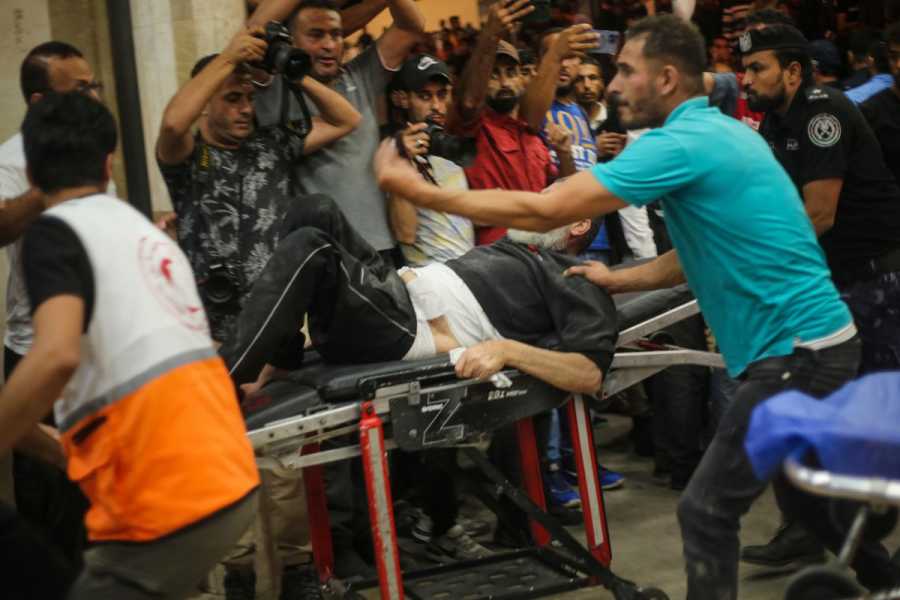Israel’s evacuation order is creating chaos in Gaza. A ground invasion will be worse.

Palestinians injured during Israeli raids are treated at Nasser Hospital in the city of Khan Younis, in the southern Gaza Strip, on October 14, 2023. Ahmad Hasaballah/Getty Images Ellen Ioanes covers breaking and general assignment news as the weekend reporter at Vox. She previously worked at Business Insider covering the military and global conflicts.
An airstrike on Friday hit a convoy of Palestinians, killing at least 12, including women and young children, as they tried to flee northern Gaza at the direction of the Israel Defense Forces, ahead of a presumed ground operation in the region. Hamas has blamed the IDF for the strike, which occurred on an evacuation route the military deemed safe.
The strike came hours after the IDF had given the approximately 1.1 million people of northern Gaza 24 hours to evacuate the region. The United Nations said the operation would have dire humanitarian consequences in a part of the world that had already been facing humanitarian disaster before Israel declared it would retaliate for the Hamas attacks on October 7. On Sunday Israel announced another, brief window for Gazans to flee south.
The situation on the ground in Gaza is “fast becoming untenable,” Martin Griffiths, the UN humanitarian aid chief, said in a statement Saturday. On Monday, the Israeli government shut off Gaza’s access to water, electricity, and fuel as part of its declared siege of the region. Gaza has been under blockade by both Israel and Egypt since 2007, and access to basic goods, including food and medicine, is available only via the UN and nongovernmental organizations.
“I fear that the worst is yet to come,” Griffiths added.
Since Hamas, the militant Islamic group that has controlled Gaza since 2007, launched an unprecedented and brutal attack against Israel that killed at least 1,300 people a week ago, the Israeli Air Force (IAF) has run multiple sorties over Gaza, dropping at least 6,000 munitions. Those operations have so far killed more than 1,500 Palestinians, including civilians.
Though US officials have reportedly begun to caution Israel to minimize civilian deaths during upcoming operations, Gazans are already vulnerable; roads damaged from the current and previous airstrikes make evacuation slow and dangerous, and many buildings cannot withstand such bombardment because they’ve been affected by previous airstrikes and there’s no capacity to repair them.
Supplies like food, fuel, medicine, and clean water are already running critically low in the region, and as of yet there is no humanitarian corridor to get supplies into Gaza — or get people out. US officials are working with Egyptian authorities to open up such a route at the Rafah crossing on Gaza’s southern border so that the UN can get supplies into the region. There has also been an effort to get the crossing open so that American citizens in Gaza can escape, but the White House claims that Hamas is preventing it from being opened.
A decade and a half of conflict has already brought Gaza to its knees
Egypt and Israel closed their borders with Gaza after Hamas took control of the territory in 2007, following a brief civil war between Hamas forces and factions loyal to Palestinian Authority leader Mahmoud Abbas, who oversees the West Bank. Both Egypt and Israel imposed the blockade because they feared Hamas would bring further instability to their backyard due to the group’s ties to Iran and to Egypt’s Muslim Brotherhood.
As of 2017, the poverty rate in Gaza was 53 percent and a third of people lived in extreme poverty, according to the Palestinian Bureau of Central Statistics; 63 percent of people in Gaza are food-insecure, according to current statistics from the World Food Programme. Since 2017, the price of basic necessities has increased precipitously due, in part, to global inflation in the wake of the Covid-19 pandemic.
Most of Gaza’s water is undrinkable, and low-level cholera outbreaks are common; a significant portion of the region’s infrastructure has been decimated by previous airstrikes, making crushing injuries and deaths common during conflict, Helen Ottens-Patterson, Médecins Sans Frontieres’ former head of mission in Gaza, told Vox in an interview.
More than 2 million Gazans live in a strip of land the size of Philadelphia, making it one of the most densely populated places on the planet, which increases the possibility of hitting civilians during military operations. And about 42.5 percent of the population is under the age of 14, making childhood casualties common in times of conflict.
“Today, all of the patients we received at our clinic in Gaza City were children between 10 and 14,” Ayman Al-Djaroucha, MSF deputy project coordinator in Gaza, said in a Wednesday email statement. “This is because the majority of the injured in Gaza are women and children, since they are the ones who are most often in the houses that get destroyed in the airstrikes.”
Though Israeli military policy is to use disproportionate force in Gaza as a deterrent strategy, that has so far failed to enact durable security, limit Hamas’s ability to strike Israel, or allow space in Israeli politics for any sort of political negotiation that could lead to a more peaceful future.
It has also resulted in devastating civilian losses on the Palestinian side; in 2014, simmering conflict in Gaza exploded into a major Hamas rocket offensive into Israel, which responded with a 19-day ground invasion. Though there was an Egypt-mediated ceasefire in August of that year, 2,251 Palestinians — including 1,462 civilians — and 73 Israelis, mostly soldiers, were killed in the fighting, according to the United Nations Office for the Coordination of Humanitarian Affairs.
Gazans are running out of supplies — and time
By Tuesday, an MSF hospital in northern Gaza had used three weeks’ worth of supplies, Ottens-Patterson told Vox. Whatever buffer supply of fuel, food, medication, and medical supplies hospitals had prior to October 7 is quickly dwindling. “You can imagine within a month, they’re going to be running on empty — or within an even shorter space of time,” she said.
Now, with people evacuating to the south, those problems compound. There’s no way to safely evacuate patients from hospitals to the south; roads damaged by this and previous conflicts make that challenging. Multiple ambulances and medics have also been hit by airstrikes in the past week.
Southern Gaza also has only about half the number of hospitals as the north, so even patients who do get evacuated can’t find a bed, Zaher Sahloul, the head of MedGlobal, a medical NGO that operates in crisis zones, told Vox in an interview.
“Southern Gaza doesn’t have the infrastructure, the food, the capacity, to have all of these people,” he said. “So it’s going to create a huge humanitarian crisis in southern Gaza, where you will have people dying of dehydration, [disease] outbreaks — the water is not clean — malnutrition, besides, of course, injuries from bombings. It’s a near-impossible situation.”
But moving people to Egypt for treatment is complicated, too — partly because Egypt isn’t allowing it right now. Furthermore, Sahloul said, “We’re against that as an international organization. We’re against evacuating people from their homeland [so they become] refugees.”
Egypt is unwilling to host Palestinian refugees as of now because of internal pressures and because it doesn’t wish to get sucked into the war. But there’s also the fact that many Palestinians have been expelled from their homes since the Nakba in 1948. Now, as then, leaving could mean never coming back.
As the war progresses, UN experts, as well as other advocates and some politicians, have indicated that Israel’s actions amount to collective punishment of all Gazans for the acts of the militant group that controls it
Gazans “have lived under unlawful blockade for 16 years, and already gone through five major brutal wars, which remain unaccounted for,” UN experts said in a statement Thursday. “This amounts to collective punishment. There is no justification for violence that indiscriminately targets innocent civilians, whether by Hamas or Israeli forces. This is absolutely prohibited under international law and amounts to a war crime.”
Meanwhile, an IDF ground invasion seems imminent; Israeli Prime Minister Benjamin Netanyahu visited IDF troops at the border with Gaza Saturday, Reuters reported, asking if they were “ready for the next stage.” Without elaborating, Netanyahu told the soldiers that “the next stage is coming.”
Update, October 15, 12:40 pm ET: This story, originally published October 14, has been updated with emerging information.
Sourse: vox.com






